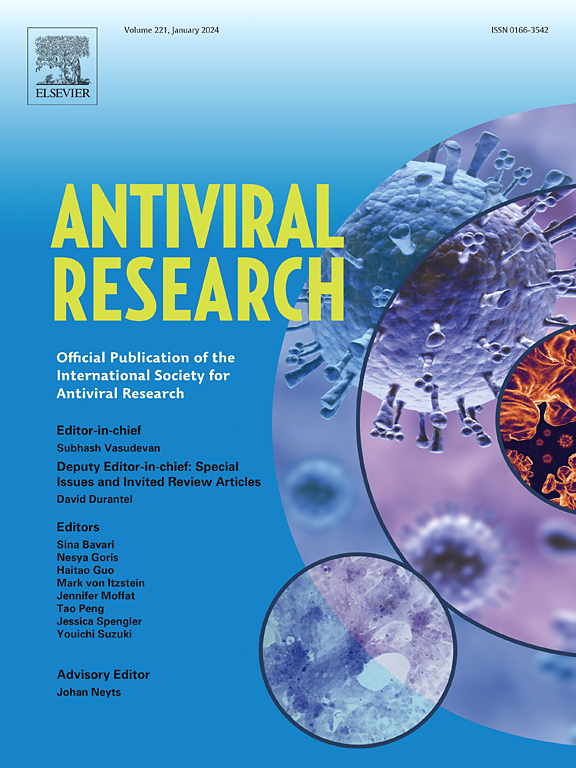Mammalian-targeted antiviral peptide reduces dengue virus type 1 infection in Aedes aegypti
IF 4.5
2区 医学
Q1 PHARMACOLOGY & PHARMACY
引用次数: 0
Abstract
Dengue virus is the most important arbovirus for public health worldwide. Aedes aegypti is the DENV primary vector and acquires the virus during blood meal from a viremic human. BCN0941 is a structure-based designed antiviral peptide that inhibits early stages of DENV infection in mammalian cells [WO2015131858A2]. Studies of structure-activity relationship indicate that the molecular target of the antiviral activity of BCN0941 is the Low-density lipoprotein receptor related protein-1 (LRP1), an evolutionary conserved receptor that we have identified as putative DENV receptor in mammalian cells. In this work, we evaluated the antiviral activity of BCN0941 peptide against DENV serotype 1 in mosquito cells. In vitro assays were performed in cell lines C6/36 (Aedes albopictus) and Aag2 (Aedes aegypti). The antiviral activity in vivo in a metapopulation of field-collected A. aegypti mosquitoes was also evaluated. BCN0941 peptide exhibited the capacity to decrease viral infection in both experimental set up, in vivo and in vitro, up to a 50 % and 60 % of the treatment controls respectively, as determined by immunofluorescence. BCN0941 may be an effective DENV transmission-blocking drug due to its dual action in decreasing the viral load in infected people and the mosquito vector.
哺乳动物靶向抗病毒肽可减少埃及伊蚊中1型登革热病毒感染
登革热病毒是全球公共卫生最重要的虫媒病毒。埃及伊蚊是登革热病毒的主要媒介,并在从病毒血症人的血液中获得病毒。BCN0941是一种基于结构设计的抗病毒肽,可抑制哺乳动物细胞早期DENV感染[WO2015131858A2]。构效关系研究表明,BCN0941抗病毒活性的分子靶点是低密度脂蛋白受体相关蛋白-1 (LRP1),这是一种进化保守的受体,我们已经确定它可能是哺乳动物细胞中的DENV受体。在这项工作中,我们评估了BCN0941肽对蚊子细胞中DENV血清型1的抗病毒活性。体外检测细胞C6/36(白纹伊蚊)和Aag2(埃及伊蚊)。对野外采集的埃及伊蚊超种群体内抗病毒活性进行了评价。通过免疫荧光测定,BCN0941肽在体内和体外实验中均表现出减少病毒感染的能力,分别达到治疗对照组的50%和60%。BCN0941可能是一种有效的DENV传播阻断药物,具有降低感染者和蚊虫载体病毒载量的双重作用。
本文章由计算机程序翻译,如有差异,请以英文原文为准。
求助全文
约1分钟内获得全文
求助全文
来源期刊

Antiviral research
医学-病毒学
CiteScore
17.10
自引率
3.90%
发文量
157
审稿时长
34 days
期刊介绍:
Antiviral Research is a journal that focuses on various aspects of controlling viral infections in both humans and animals. It is a platform for publishing research reports, short communications, review articles, and commentaries. The journal covers a wide range of topics including antiviral drugs, antibodies, and host-response modifiers. These topics encompass their synthesis, in vitro and in vivo testing, as well as mechanisms of action. Additionally, the journal also publishes studies on the development of new or improved vaccines against viral infections in humans. It delves into assessing the safety of drugs and vaccines, tracking the evolution of drug or vaccine-resistant viruses, and developing effective countermeasures. Another area of interest includes the identification and validation of new drug targets. The journal further explores laboratory animal models of viral diseases, investigates the pathogenesis of viral diseases, and examines the mechanisms by which viruses avoid host immune responses.
 求助内容:
求助内容: 应助结果提醒方式:
应助结果提醒方式:


